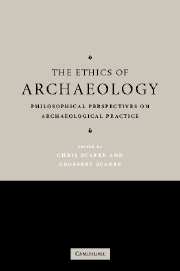Book contents
- Frontmatter
- Contents
- List of contributors
- Acknowledgements
- 1 Introduction
- PART I THE OWNERSHIP OF CULTURAL OBJECTS
- PART II ARCHAEOLOGISTS AND THE LIVING
- PART III ARCHAEOLOGISTS AND THE DEAD
- 11 Can archaeology harm the dead?
- 12 Archaeological ethics and the people of the past
- PART IV THE COMMON HERITAGE OF HUMANKIND?
- References
- Index
11 - Can archaeology harm the dead?
Published online by Cambridge University Press: 05 June 2012
- Frontmatter
- Contents
- List of contributors
- Acknowledgements
- 1 Introduction
- PART I THE OWNERSHIP OF CULTURAL OBJECTS
- PART II ARCHAEOLOGISTS AND THE LIVING
- PART III ARCHAEOLOGISTS AND THE DEAD
- 11 Can archaeology harm the dead?
- 12 Archaeological ethics and the people of the past
- PART IV THE COMMON HERITAGE OF HUMANKIND?
- References
- Index
Summary
Death and the sun, said the Duc de la Rochefoucauld, are two things that cannot be looked at steadily. If our own death is a daunting prospect, many archaeologists, anthropologists and collection curators spend a large portion of their professional lives confronting death, or at least the dead. From an academic point of view, the study of the corporeal remains of human beings and of the mode of their disposal is a crucial source of knowledge of the human past. Yet from an ethical perspective the highly intrusive nature of much of this study raises problems. Whilst a bone may be no more animate than a stone, it is the relic of a man or woman who once thought and felt, was happy and sad, loved and feared as we do. To disinter or disturb it, or to subject it to chemical or physical analysis, is to take a liberty – not with the thing itself but with the person to whom it once belonged. Kant famously held that we should treat human beings as ends in themselves, never merely as means to our own or others' advantage. Using the dead as a research resource is prima facie inconsistent with this principle since it is hard to see how such treatment can be of any benefit to the subjects.
- Type
- Chapter
- Information
- The Ethics of ArchaeologyPhilosophical Perspectives on Archaeological Practice, pp. 181 - 198Publisher: Cambridge University PressPrint publication year: 2006
- 24
- Cited by

